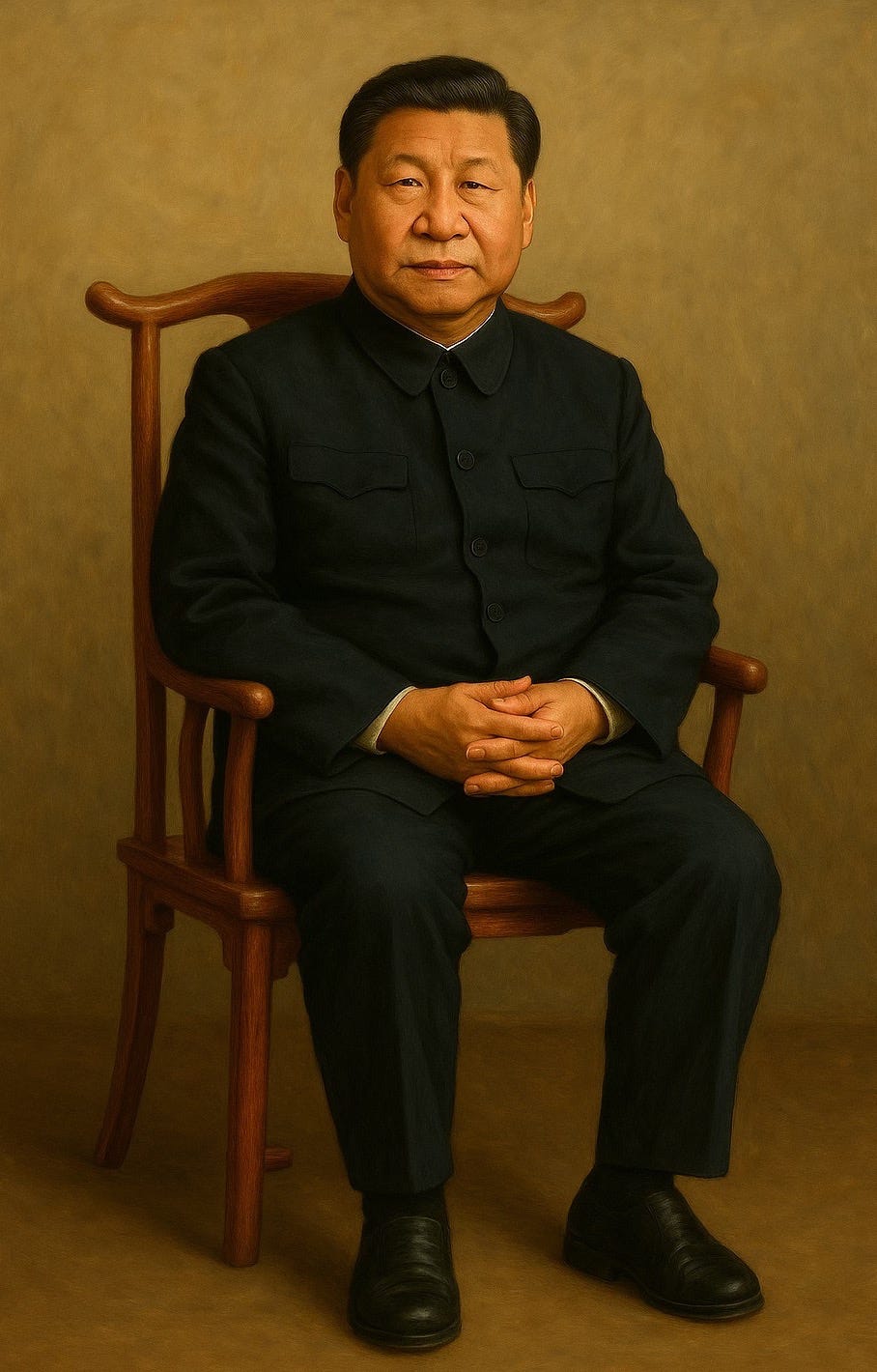Xi's Wobble
From Bo Xilai to Liu Jianchao
In my earlier analysis Who Will Succeed Xi? I examined the long game—succession scenarios that could shape China’s leadership beyond Xi Jinping. This article turns to the here and now: the mechanics of power under Xi, and the risks this structure poses for US counterparts in ongoing negotiations.
In Xi Jinping’s China, one man is the ultimate source of strength and a single point of failure for 1.3 billion people. His grip on power keeps the system balanced—but that same concentration makes it inherently fragile, like a chair with one missing leg, a single shift away from collapse.
In this AI-generated image, Xi Jinping sits in a Ming-style official’s chair, an echo of China’s insular imperial past. At first glance, the chair is timeless and sturdy. Look closer and one back leg is missing. Xi sits up perfectly straight, but the imbalance is real. It is a visual metaphor for the state of China’s political system under Xi—not that he is about to fall tomorrow, but that authoritarian structures concentrating authority in one person are inherently wobbly, requiring constant shifts to remain balanced.
In recent news, Liu Jianchao, head of the CCP’s International Liaison Department and a likely candidate for foreign minister, was taken in for questioning after returning from overseas travel.1 No charges have been announced, but his sudden absence fits a familiar pattern under Xi’s rule, in which elite officials vanish without explanation, only to reappear months later in a corruption trial—or not at all. He reportedly studied at Oxford; perhaps he did not fit in with the current Politburo elite, many of whom were educated at home. A foreign education is increasingly seen as a liability in China today.
Bo Xilai Before the Fall
The origins of this pattern trace back to Bo Xilai. In 2012, the charismatic, Maoist Chongqing Party Secretary, and a rival to Xi, was blindsided when his police chief fled to a US consulate, revealing a murder scandal involving Bo’s wife; the victim was British. Within months, Bo was stripped of power, expelled from the Party, and in 2013 was sentenced to life in prison for bribery, embezzlement, and abuse of power. 2
All of this happened at the tail end of Hu Jintao’s leadership, and it could be argued that this was an own goal involving an actual crime. But it marks the downfall of a key Xi rival, and a new era in leadership governance. Curiously, Bo’s legacy survives in the form of a revival of Maoist sentiments in China, particularly among the young “Pinks”.
The Six S’s: Xi’s Playbook for Political Control
Some analysts assume that sudden personnel shifts that confound outsiders mean that Xi himself is in danger of losing power, citing recent purges of the PLA. However, this pattern is deeply structural, entirely predictable, and has persisted for over a decade:
Signal – Trip cancellations by top officials, reduced media presence, odd omissions from public events.
Silence – Disappearance without explanation, or vague “health reasons.”
Scrub – Biographies altered, photos and speeches erased from official websites.
Substitution – Successor appointed before any official rationale.
Showcase – Weeks or months later, an announcement of “serious violations” or corruption charges.
Sentencing – Party expulsion and/or criminal conviction, often long after.
Recent examples include Qin Gang’s removal as foreign minister in 2023,3 Defense Minister Li Shangfu’s disappearance the same year, 4 and the wholesale purge of the PLA Rocket Force. 5
Subscribe to continue reading to see which Chinese positions are truly stable — and why they’re still risky for US negotiators.
Keep reading with a 7-day free trial
Subscribe to econVue to keep reading this post and get 7 days of free access to the full post archives.



